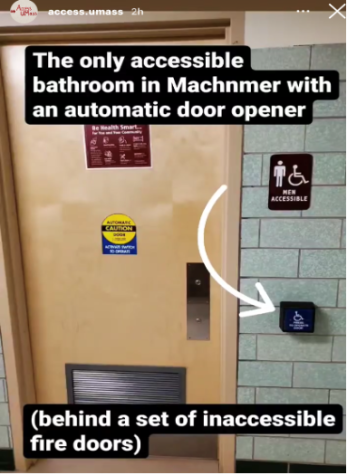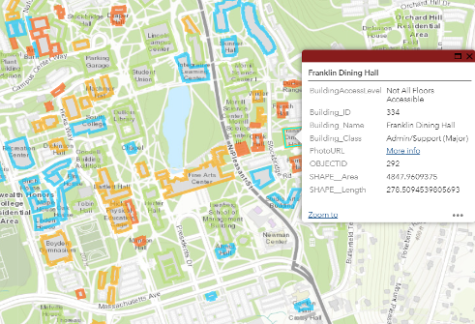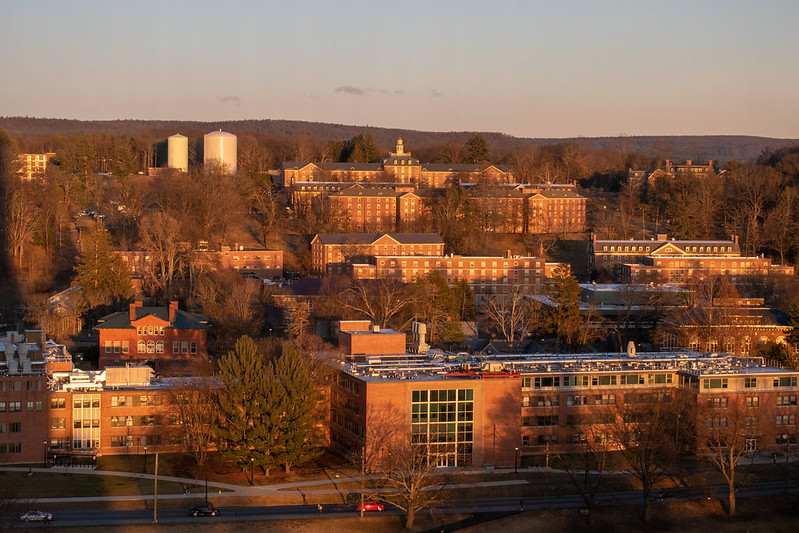Last semester, a group of students came together to address accessibility issues and disability rights on campus. Now, the group is formally known as Access UMass, a collective of student activists addressing problems that can’t be ignored any longer. The group met on Tuesday to hold their third official meeting of the semester, where these problems were discussed by students. These issues included inaccessible physical design throughout campus, as well as a lack of educational resources and class accommodations.
The meeting discussion was led by senior communications major Mya Pol.
The group has been gaining traction after Pol put out several videos on Tiktok providing information about disability-specific terminology and showcasing several inaccessible locations on campus.
Since then, Access UMass has been featured in the WMUA News: Up to the Minute podcast series, and has amassed a following of more than 2,000 followers on their Instagram.
During the meeting, members of Access UMass also discussed how the University of Massachusetts’ gender-neutral bathrooms are inaccessible, despite their meaning to provide access. The newly renovated Student Union, completed in the fall of 2020, was found to have this problem, and an article was published last semester drawing attention to the issue.
Students also shared that in some cases, the bathrooms for male students were the only ones equipped with push buttons.

The problem that arises from the lack of bathroom push buttons can be seen among popular academic and social buildings throughout campus, including the Student Union, Integrative Learning Center and Worcester Dining Commons. While the entrances to these buildings are accessible, once inside, a disabled student can struggle with entering a bathroom.
“The accessible men’s bathroom in Franklin Dining Hall has no push button, where the stall was kicked down,” said sophomore STPEC major Marcel Raisbeck.

However, the lack of bathroom push buttons doesn’t just appear in the newer buildings on campus. Older buildings are no better – the Morrill Science Center, which was constructed between 1950 and 1966, doesn’t have any at all.
Ramps are a challenge too, inside and out. During the winter, ramps are affected by the weather and can become inaccessible. There was recently a call to UMPD officers to clear off icy roads and snow off of ramps for students.
“The design is not uniform. It was not planned for students with accessibility needs,” Raisbeck said.
Other areas on campus, such as Durfee Conservatory and the courtyard of the W.E.B. Du Bois Library that are known for their serene and relaxing environments, pose design challenges as well.
“At Durfee, the entrance is rocky and narrow, and the doors that go out to the courtyard don’t seem to have any push buttons,” Raisbeck said.
As the meeting discussion carried on, several students began to elaborate on how inaccessible design arises within the dining halls where able-bodied students may not even realize. Tables are set up in such a way that students in wheelchairs can get trapped, depending on if chairs are properly pushed in after eating by other students.
“I skip meals between classes,” a comment on Zoom from Raisbeck reads, where the heads of other students nodded up and down in agreement.
It is not only hard for physically disabled students to navigate the dining halls, but also for students with sensory sensitivity.
“If you’re trying to get out and it’s busy, and don’t feel comfortable going to the elevator, it can be horrible,” Raisbeck said.
When looking at the Disability Services website, there is a link to the Campus Accessibility map. Several are highlighted in orange, and when clicked on for Franklin Dining Hall, it shows that not all floors are accessible.

Aside from the physical barriers that campus buildings pose for students who are trying to get to class, acquiring accommodations can lead to students facing academic barriers, as well.
Accommodations are provided for students with access needs for transportation such as visual aids. For students who have to cross North Pleasant Street when walking to Franklin Dining Hall, this can pose a challenge within itself.
“There are people with limited vision who don’t know when to cross the street at North Pleasant, which is the only way to get to Central [Residential Area], which is the only accessible area, so they have to guess,” Raisbeck said. “Guesswork is a major part of the anxiety of being disabled.”
There are also accommodations for students with access needs for learning. Students can obtain class notes or have excused absences if they can’t make it to class. The database “Clockwork” is used for uploading notes, requesting proctored exams or obtaining copies of accommodation forms.
For students who are deaf or hard of hearing, according to the Disability Services website, they “work closely with the communication access program to obtain the appropriate accommodations for their disability.”
The problem of not meeting accommodations that are provided by Disability Services has become part of a larger systemic issue for students — a lack of funding. Unfortunately, COVID-19 has had a big impact on funding within disability services.
“The rule is you send an email, and you don’t hear back,” Raisbeck said. “We need people to be adequately compensated for what they are doing within Disability Services, including training for new students on what they can ask for in accommodations.”
Students at the meeting were concerned that the absence of outreach from the school will hurt first-year students. Furthermore, the lack of budgeting for these services will continue to hurt the student body if there isn’t an increase.
“When I was just starting my time here at UMass, I looked for resources for those with disabilities other than Disability Services and could not find them. It has taken time and jumping through endless hoops to find programs like the van service, which isn’t advertised anywhere. Resources outside of Disability Services should be promoted much more than they are so that those who need resources can find them. At this point in time, they’re practically invisible,” sophomore english major Silas Reed said.
For many students, they may not know how to navigate, or have even heard about the website before, so digital accessibility is a challenge as well.
“UMass doesn’t tell their students the resources they have or what resources they can use,” Raisbeck said. “The University is not transparent. They want to give able-bodied people the impression that everyone has an equitable chance. They’re creating these barriers thinking about the people watching, but not the people walking through them.”
While there are laws in place that can be used as educational resources for students and faculty to learn about disability rights, students feel as though they aren’t being upheld.
“I feel that professors aren’t very informed about accessibility and what it means for a class to be truly accessible. I’ve heard horror stories of professors denying accommodations for entire semesters because it interferes with their teaching styles. The faculty here at UMass should be taught how to interact respectfully with those using accommodations,” Reed said.
Under Title II of the Americans with Disabilities Act (ADA), the title “prohibits discrimination against qualified individuals with disabilities in all programs, activities, and service of public entities.”
Students also discussed the problem with the University not providing enough education about the relationship between students and accessibility.
“They put in artificial deadlines in syllabi to try to make plans for students with accessibility needs. But you can become disabled in the middle of the semester, at any time,” Raisbeck said.
Though, it was noted by Pol that “there have been a few administrators who have been positive, supportive, and effective.”
Currently, Interim Dean of the Library Sarah Hutton has been working with the group to get sensitivity training put in place and trying to make space for a cultural center.
“She seems to be actually interested in helping us make a difference in the ways that she can,” Pol said.
As the meeting was nearing the end, a discussion of a list of demands to address these issues was brought to the students’ attention.
Access UMass currently wants to implement mandatory training for all faculty and staff, disability sensitivity training for incoming students, increased funding and resources for disability services and the approval of a disability equity and advocacy task force to help with the implementation of the demands. Last semester, SGA held a meeting to approve of this task force.
A full list of demands should soon be expected. Access UMass also talked about future plans to work with SGA in order to broaden the list, and ultimately the administration.
“SGA members have reached out, but I think the administration is hoping that we’re just going to follow the standard University movement pattern, where the leaders of the movement graduate and then the movement dies out within the next year,” Pol explained. “But we are very much aware that that is a thing, and we are not going to let that happen. We are not going to let UMass ignore us.”
In their “Campus Access” petition to the chancellor, they have listed that they would like three main things:
- “Improve infrastructure so all students experience equity in physical access to campus spaces.”
- “Educate faculty, staff, and students on disabled experiences and disability rights (specifically in the scope of education).”
- “Create and enforce policy surrounding disability on campus to ensure a truly inclusive and equitable college experience for all students, especially those of us with disabilities.”
For more information, there is a list of resources that can be looked at here. Meetings will continue to be held every Tuesday, where students can join via Zoom or in-person located in the main floor of the Student Union at 5:30 p.m.
Olivia Capriotti can be reached at [email protected]. Ariana Gonzalez can be reached at [email protected].





















